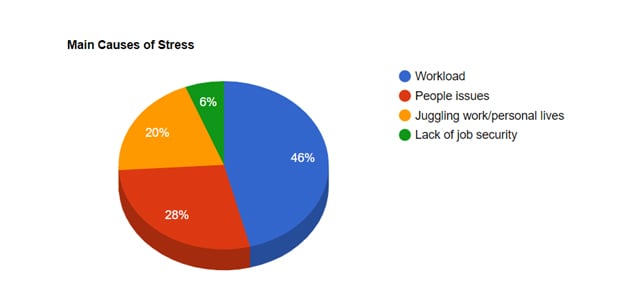As professionals in management positions, we have all felt the mental and physical impact of stress. As our General Practitioners tell us, as supported by recent research from the UN Labor Agency, work-related stress is deadly!
The number 1 cause of stress people identified is their jobs.
As managers, and people who oversee their team’s overall productivity, it is the management team’s responsibility to help employees better manage these stressors. It is not only our responsibility to help figure out ways to reduce the stress through efficiencies and organizational changes but also by supporting employees who are taking the proper steps to manage the stress themselves.
16% of all employees quit their jobs due to stress.
If the management team isn’t taking this seriously, the Great Resignation that all companies are facing is going to continue to get worse. Everyone is reevaluating what they want out of personal and professional life and the amount of stress a person will endure from work has a huge impact on if they choose to stay with a company or leave.
How do we minimize the impact of the Great Resignation on our organization?
We believe it comes from first improving the overall relationship between employees and their management team. This doesn’t mean ill-guided free pizza lunches, but rather cultivating a relationship that increases the employee’s comfortability to speak frankly with their management team about the issues they are facing. This will be particularly difficult as over one-third of all employees cited that their boss was the core source of stress in the office (Korn Ferry Institute).

But what is better than good pizza? Actually giving a shit!
How do we give a shit with limited budget and resources?
- Prioritize and sticky notes! – Remembering important things in an employee’s personal life and then following up to check in and see how they are doing is how employees know they are valued and that their management cares more about them then just how they perform on their reviews.
- Recharge and reboot – We are all burnt out with our responsibilities, deadlines, and quotas and that means we are transferring our frustrations and burnt-out attitudes onto our teams. This is where taking our own advice to also take care of ourselves by following the same requirement for self-care that we request from our employees comes into play. I get it – I tell every one of my employees to take their lunch breaks, go work out because it is good for them and helps them be more productive. But what do I do on my lunch break? I answer emails and get caught up on tasks I need to complete rather than taking my own advice. Then we wonder why I can get snippy, tired, and my back and hips hurt and it is from sitting in my chair all day without getting up, other than grabbing more water or a snack that I’ll eat while I type away on my computer.
- Recognize employees – showing genuine appreciation for your employees for more than just when they go above and beyond. But also recognizing them for their personality, their commitment to their work, and remembering when they have family obligations or are in need of a mental health day. And if a mental health day isn’t part of your budget, allowing them to take a longer lunch to help decompress or handle whatever they need will go a long way.
- Demonstrate effective use of technology – don’t force a meeting when it should be in an email or a chat message. Their time is more important than management’s inflated sense of importance.
So by placing the effort on taking more of an investment of our employees lives, investing in our own mental health, and any simple operational fixes we can do to improve the manager and employee relationship, your teams are able to work together to find solutions to improve productivity and company culture and thus helping to reduce the amount of stress that is felt.
Follow Diamond Media Solutions and our COO Jayme Hill Gardner on our socials for more tips on how to improve your corporate culture and reduce your companies impact.


No Comments
Sorry, the comment form is closed at this time.